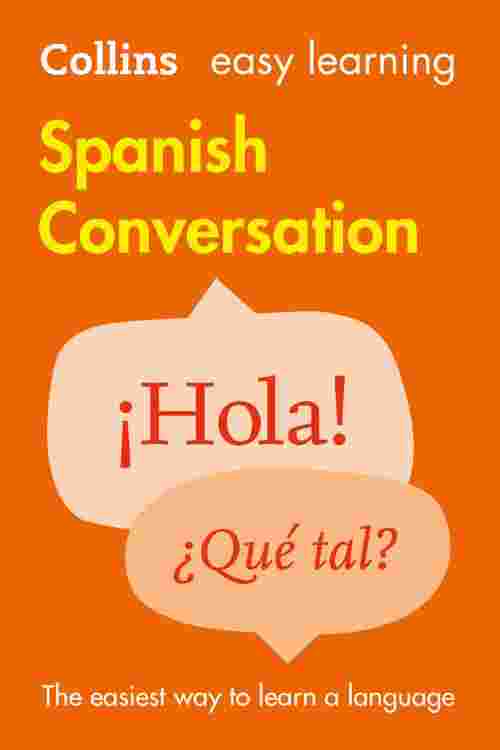
[PDF] Easy Learning Spanish Conversation by eBook Perlego
Collins Spanish conversation. Publication date 2006 Topics Spanish language -- Conversation and phrase books -- English, Spanish language -- Spoken Spanish, Spanish language Publisher Glasgow : HarperCollins Collection. EPUB and PDF access not available for this item. IN COLLECTIONS

Spanish Conversation PDF
1. Hola (Hi) 2. ¿Cómo estás? (How are you?) 3. ¿Qué onda? (What's up?) 4. ¿Qué tal? (How's it going?) 5. ¿Has escuchado lo de María? (Have you heard the news about Maria?) Okay, it does sound a bit gossipy, but a friendly, nice gossip won't hurt anyone….maybe about a famous person's recent achievement or something like that. 6.
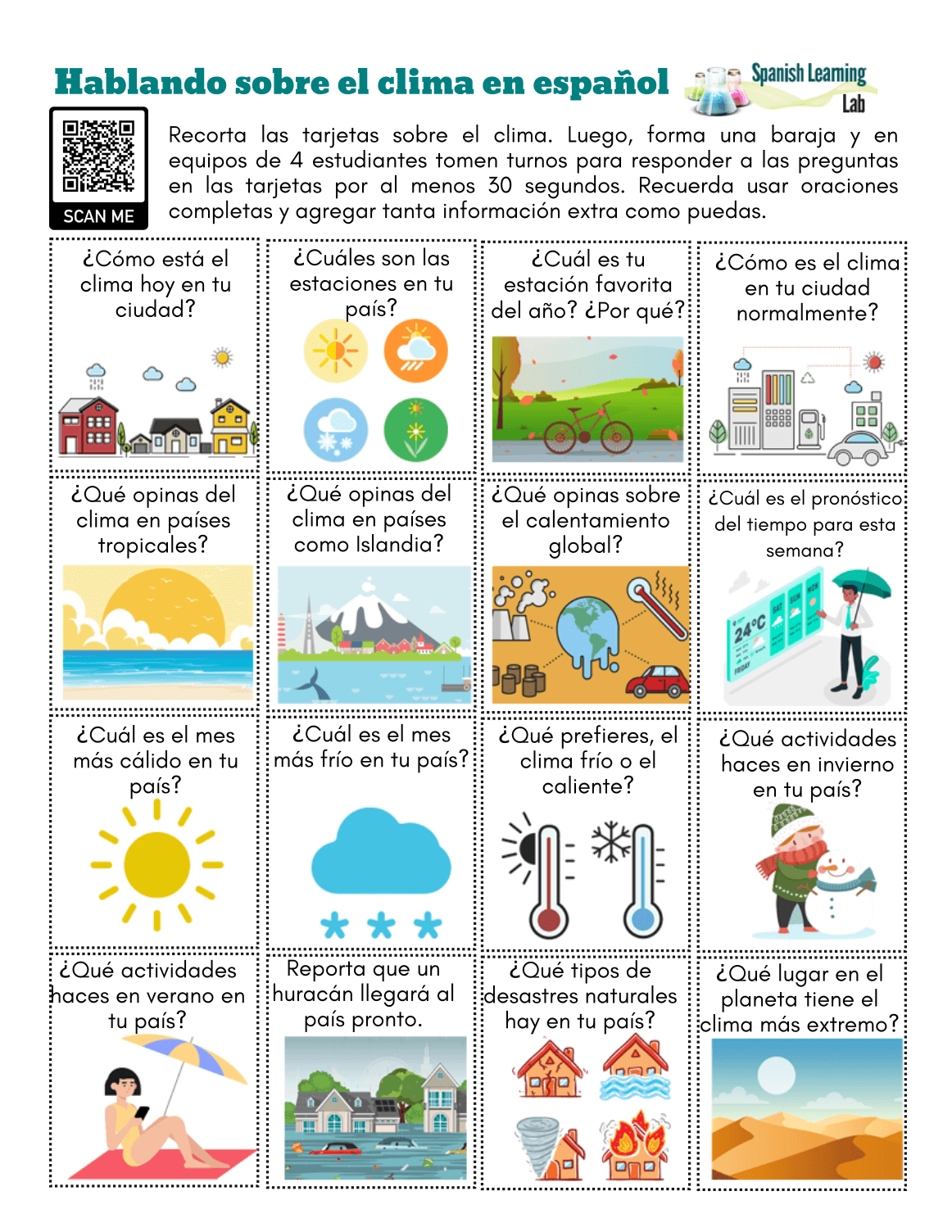
Weather conversation cards in Spanish PDF Worksheet Spanish Learning Lab
Spanish pronunciation used in Spain. However, in Latin America, people pronounced a 'c' like this as This is the traditional Spanish pronunciation used in Spain. However, in Latin America, people pronounced the 'c' as a 's' sound (e.g. des-PAS-ee-o) QUESTION WORDS IN SPANISH Conversation is a two-way street.

Spanish Conversation [PDF] [7l8r1ck95330]
WELCOME TO LEVEL A1.1 OF LEARNING SPANISH! This level is all about giving you clear and comprehensive content so you can start using everyday expressions and basic phrases in Spanish. Through the resources and exercises in this document, you can improve your skills and, more importantly, gain confidence in the basics of the Spanish language.

This is a simple quick reference guide that students can use to practice conversational Spanish
Over 500 authentic Spanish dialogues recorded in 13 countries! These dialogues in Spanish were developed for novice, intermediate and advanced students and each dialogue includes both Spanish and English translations. Most of the lower level Spanish dialogues are recorded in slow Spanish. In addition, we provide dialogues recorded in very slow.

Spanish Conversation Editable Task Cards Present Tense Speaking Practice How to speak spanish
101 Conversations in Spoken Spanish prepares you to speak Spanis h in the real world. Unlike the contrived and unnatural dialogues in your textbook, the 101 authentic conversations in this book offer you simple but authentic spoken Spanish which you can study away from the pressure of face-to -face conversation.

Most common Spanish and English phrases Common spanish phrases, Spanish basics, Basic spanish
Conversational Spanish Volume I Workbook by Maria Oliveira. You will also find the Workbook's complete table of contents to demonstrate the scope and range of the vocabulary and grammar covered in this series. For more information or to place an order call 707-746-5979 or e-mail us at [email protected]

Learn easy conversation starters in Spanish! Don't to download your free pdf of 30
SPANISH CONVERSATION AND PHRASES (PDF) _ Do you want to improve your knowledge of Spanish by having the right phrases and expressions at all times? Look no further! These lists contains thousands of all the essential phrases for saying and understanding everything in Spanish, when you need to express yourself correctly and fluently for daily use.

QuickStudy Spanish Conversation Laminated Study Guide in 2022 Spanish conversation, Spanish
Buenos días. - Good morning. Buenas tardes. - Good afternoon. Buenas noches. - Good night. Hola. - Hello. ¿Cómo estás? - How are you? Bien, gracias. ¿Y tú? - Fine, thank you. And you? ¿Qué pasa? - What's up? ¿Qué tal? - What's up? ¿Qué haces?
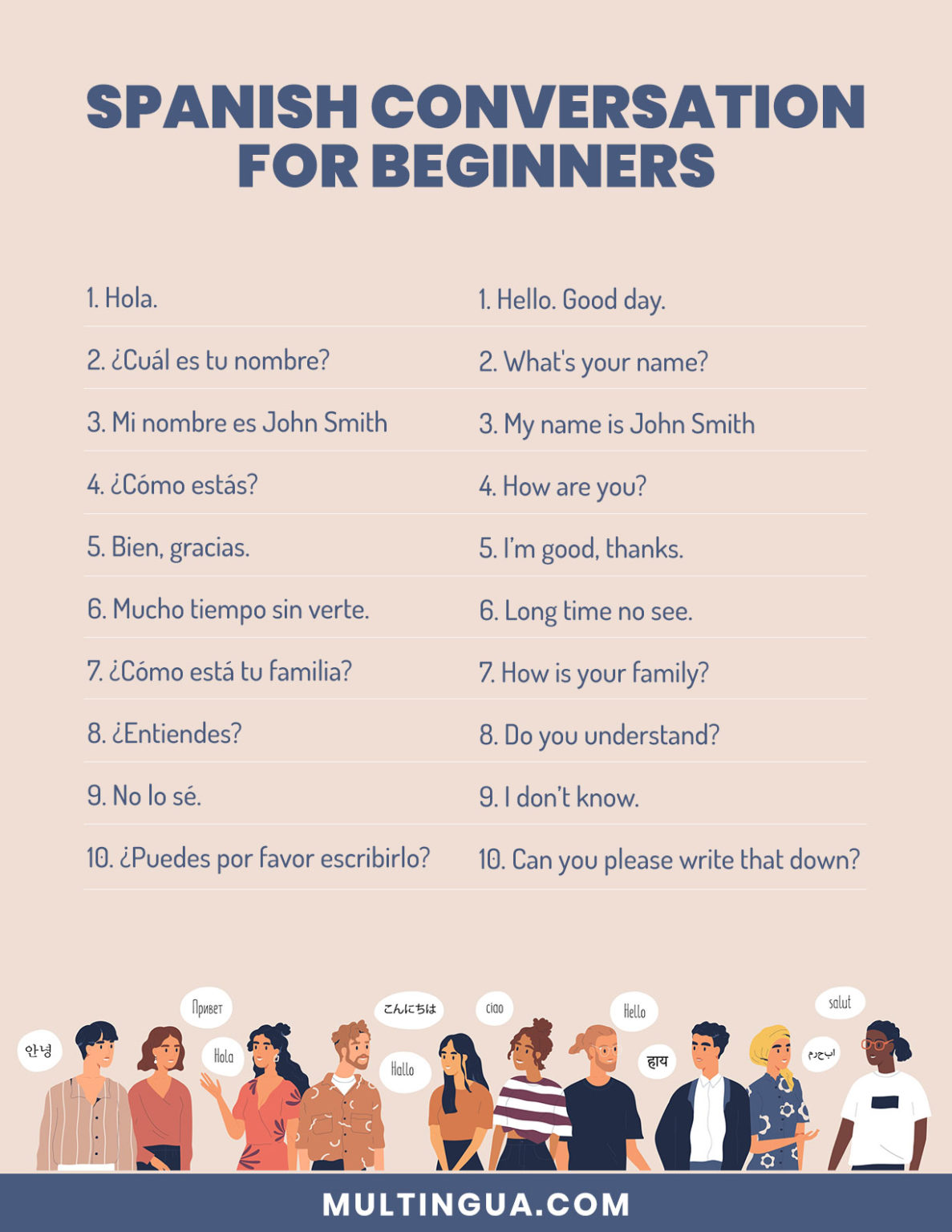
Spanish conversation for beginners Part 1 Multingua
Essential Phrases and Questions in Spanish - Dialogues in PDF ¡Hola! Thanks for joining us. This time, we are sharing a great worksheet to practice some essential phrases and questions to have your first conversation in Spanish. This PDF worksheet includes three dialogues for beginners and a gap filling exercise about them. Directions:
Conversations and Greetings in Español! — Science Leadership Academy Center City
The goal of this course is to strengthen your Spanish communication skills by (1) providing a place for regular guided oral practice of basic grammatical and conversational patterns and vocabulary through topics of current interest, (2) increasing your confidence to use Spanish inside and outside the classroom, (3) helping you add to your active.
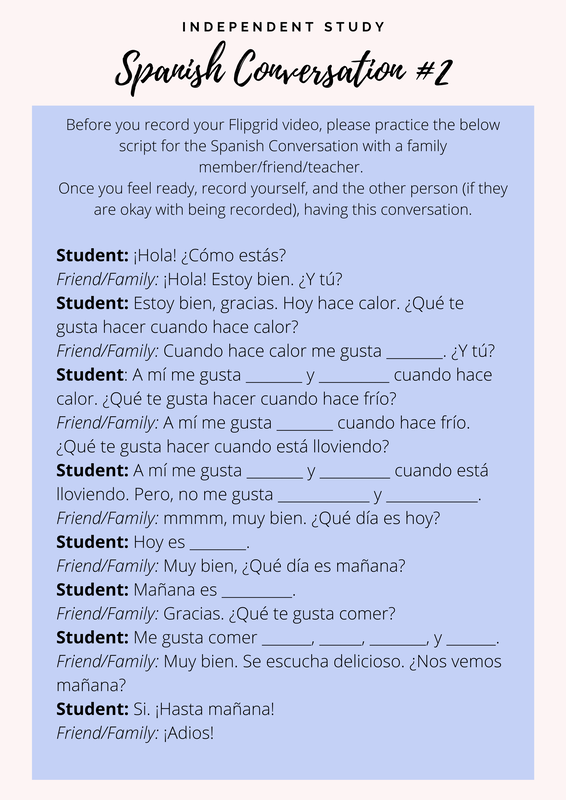
14 de marzo de 2021 Ms. Martin's Spanish Class
1: ¡Hola! ¿Qué tal todo? (Oh-lah! Kay tahl toh-doh?) Hi! How's everything? 2: Todo bien, ¿y tú? ¿Qué hay de nuevo? (Toh-doh bee-en, ee too? Kay aye deh new-eh-vo?) All is well, how about you? What's new? 1: Estoy emocionada porque este fin de semana es mi cumpleaños!

10 Easy Spanish Conversation Dialogs for Beginners
Spanish Phrases and Questions for Conversation Practice 1. ¿Cómo te llamas?/¿Cómo se llama usted? (What's your name?) This simple phrase is a must-have for when you're meeting someone new. It can be used in virtually any situation, from a party to a job interview! 2. ¿De dónde eres?/¿De dónde es usted? (Where are you from?)

Beginners Spanish Conversation guide ⋆ Travel In Two Languages
Classics as the Director of the Spanish Language Program and was responsible for supervising all graduate teaching assistants and instructors of introductory- and intermediate-level Spanish courses. In 2013, the Alabama Association of Foreign Language Teachers selected Dr. Worden as the winner of the annual Outstanding Foreign Language Teacher
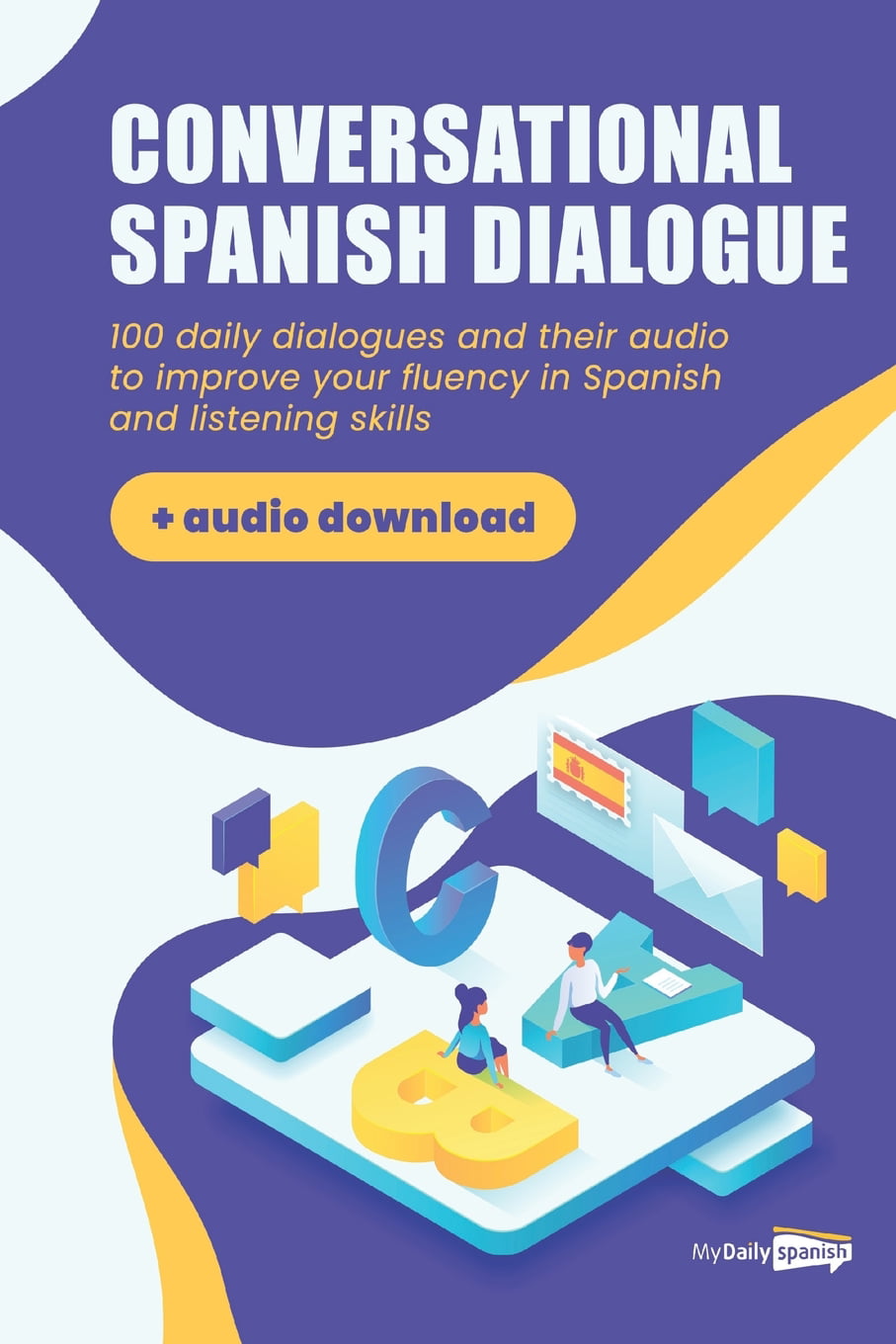
Spanish Conversation Audio Conversational Spanish Dialogues Over 100 Spanish Conversations
THE BEGINNER'S GUIDE TO SPANISH EVERYDAY VOCABULARY AND GRAMMAR TO HELP YOU SURVIVE IN SPANISH (AND THEN SOME!) TABLE OF CONTENTS CHAPTER 1 Greetings CHAPTER 2 Personal Pronouns CHAPTER 3 Definite and Indefinite Articles CHAPTER 4 Verb Conjugation CHAPTER 5 Stem-changing Verbs CHAPTER 6 Numbers 1-100 CHAPTER 7 Ser vs. Estar CHAPTER 8 Negation
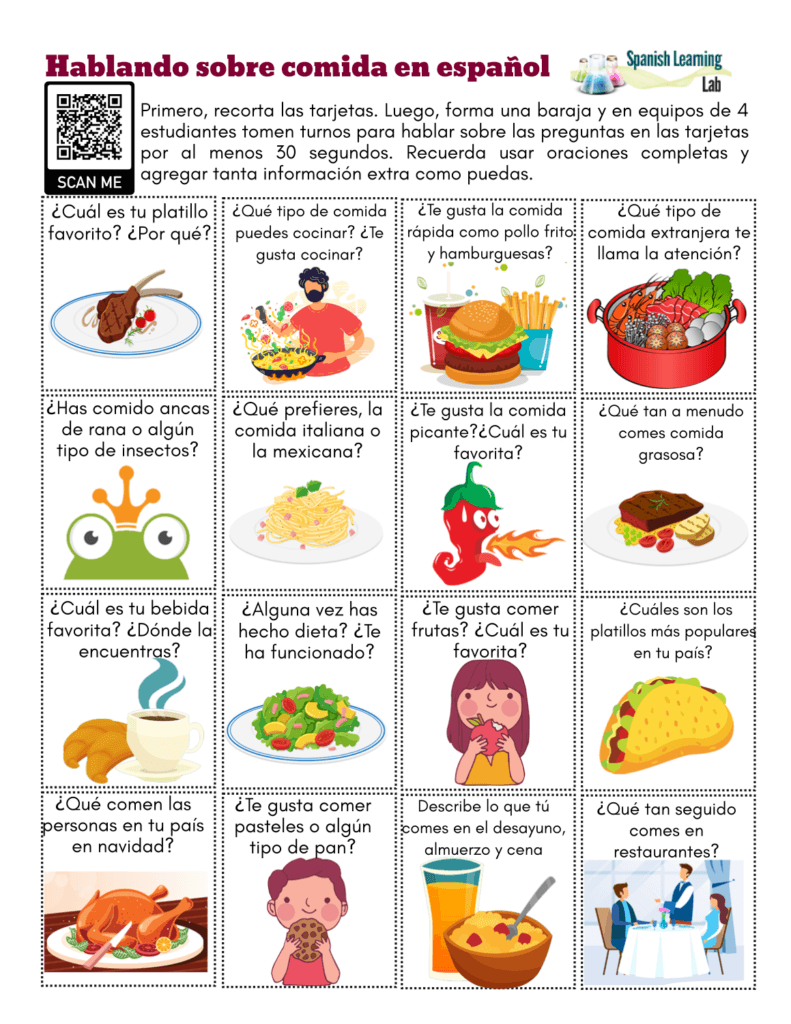
Food in Spanish conversation cards PDF worksheet SpanishLearningLab
Practice with our selection of Spanish language learning books in PDF format and you can even record yourself and then listen to your progress, this will allow you to assimilate your advances and point out your weaknesses in order to turn them into strengths later on.